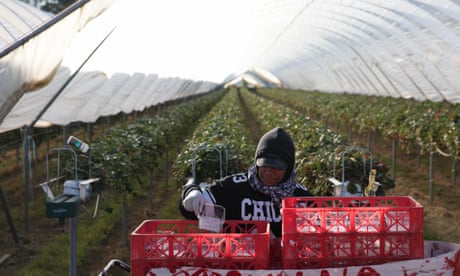- by foxnews
- 01 Feb 2025
‘Red flags’ raised over scheme to allow families of Pacific Island workers to join them in Australia
‘Red flags’ raised over scheme to allow families of Pacific Island workers to join them in Australia
- by theguardian
- 23 Jan 2023
- in news

Guest workers from Pacific Island countries will soon be able to relocate their families to Australia, but there are already concerns over "red flags" in the current design of the scheme that may make it unviable.
The federal scheme will pilot bringing up to 200 families on one- to four-year contracts starting this year, a spokesperson for the Department of Foreign Affairs and Trade said. This comes after years of the workers - who fill the gaps in Australia's agriculture, meat-works and aged care workforces under the Pacific Australia Labour Mobility scheme - being separated from their families.
However, families who do relocate to Australia would not have access to Medicare, relocation would be at the discretion of the worker's employer, and the cost of travel and setting up a home would be at the worker's expense.
And while they would have access to the childcare subsidy and family tax benefit, it was still not yet clear whether schools would be free for families Australia-wide, or only in some states.
"There are certain parameters in the way it has been set up which raises a few red flags for me in terms of the likelihood for families to actually be able to bring their families across," said Matt Withers, an expert on temporary labour migration at Australian National University.
Without more government subsidies to help workers who want to bring their families over, Withers said it would undermine the point of the scheme.
"It becomes a bit contradictory in that sense if we are loading all of these costs on to the workers themselves in a program that is basically designed to channel remittances back to Pacific Island countries," says Withers.
Kerry McCarthy, who employs about 50 Pasifika under the scheme on her farm in rural Queensland, said her workers had mixed emotions about relocating their families.
They wanted to have the connection to their children, she said, but they were also concerned about having less money when their contract ends and they return home. A number of workers use the money earned in Australia to build homes, sometimes lost to natural disasters, or to start businesses.
McCarthy, alongside Steve Burdette, the executive officer of Approved Employers of Australia, the group of businesses employing workers, is urging the government to give workers and their families access to Medicare to ease some financial burden.
"These workers pay tax, they pay the Medicare levy. They are entitled to claim that levy back but many don't," McCarthy said. "So a number are paying for it, but aren't getting any benefits."
Workers are currently required to pay for health insurance, but president of the Pacific Islands Council in Queensland, Emma Vueti, said a number had been out of pocket for pre-existing conditions because insurance didn't cover that.
This includes a number of parents working under the scheme that have had to pay thousands of dollars in hospital fees after giving birth in the first 12 months in Australia.
In advice to workers wanting to use the scheme, Dfat warned families that may fall pregnant while in Australia that they would need to consider if they have sufficient funds to travel home for the birth or pay out-of-pocket hospital costs of up to A$10,000.
"It's important they include pregnancy because we don't want families to come here then find that it's too expensive so they have to go and have the baby at home," Vueti said.
How viable it would be for workers to bring their families over also raises equity issues given workers don't have a choice on where they work in Australia, Withers said.
Robert Sivo, who is from Fiji and works in agriculture in a regional hub in New South Wales, is optimistic it will be easier to bring his six children and wife to Australia because he lives in a city. He hopes his wife, who will have the right to work in Australia, will be able to find employment to support the cost.
"The reason I want to get them over here is for their safety, because I do worry about them when I'm not there," he said. "We will try to make the cost OK."
But it will be a challenge for those living in rural areas, particularly accessing services such as childcare and whether or not there are vacant jobs for partners, and also housing.
Many workers live in shared accommodation provided by the employer at an affordable cost, but families would probably need to find a private rental, McCarthy said.
For the workers McCarthy employs, she said this will be a challenge given low rental vacancy rates in rural areas.
"Without rental history, I think it will be difficult for workers to find the rentals without the employer stepping in and taking over some of that responsibility," she said.
- by travelandtourworld
- descember 09, 2016
Thailand's Luxury Hotels Achieve Exceptional ADR Growth in 2024, Outpacing London and Singapore in Market Gains
Thailand’s luxury hotels saw remarkable ADR growth in 2024, surpassing London and Singapore in percentage increases, highlighting strong market expansion.
read more


